Privy Council of Thailand
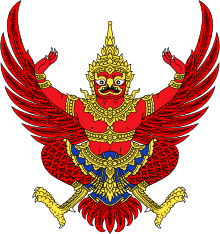 |
|---|
| This article is part of a series on the politics and government of Thailand |
|
|
|
|
|
The Privy Council of Thailand (Thai: คณะองคมนตรีไทย, khana ongkhamontri thai) is a body of appointed advisors to the Monarch of Thailand. The council, as the Constitution of Thailand stipulates, must be composed of no more than eighteen members. The council is led by the president of the Privy Council of Thailand; currently former Prime Minister, "national statesman", and Army General Prem Tinsulanonda.[1] The king alone appoints all members of the council. The council's offices are in the Privy Council Chambers, Phra Nakhon District, Bangkok.[2]
In recent years the council and its president in particular, have been accused of interfering in politics. This stems from the council's closeness to the military, in particular during the 2006 Thai coup d'état.[3] General Prem was reappointed president of the privy council by the new King Maha Vajiralongkorn on 2 December 2016,[4] although in 2018 the office was stripped of some of its powers.[5]
History

The first privy council in Siam was established by a royal decree on 8 May 1874, by King Chulalongkorn (or Rama V). The king, educated by Westerners, was keen on copying the system of government of the absolute monarchs of Europe. At first he created two councils: the "Privy Council of Siam" (Thai: ที่ปฤกษาในพระองค์; RTGS: thi prueksa nai phra ong) (49 members) and the "Council of State" (Thai: สภาที่ปรึกษาราชการแผ่นดิน; RTGS: sapha thi prueksa ratchakan phaendin) (12 members, name later changed to "Council of Ministers" (Thai: รัฐมนตรีสภา; RTGS: ratthamontrisapha)). The privy council was created to deal with legislative affairs while the latter became an early version of the cabinet.
Chulalongkorn was succeeded by his son King Vajiravudh (Rama VI) in 1910, who at the beginning of his reign appointed a 40-member "Privy Council of State" (Thai: สภากรรมการองคมนตรี; RTGS: sapha kammakan ongkhamontri). The king, during his 15 years on the throne, would continue to appoint new members at Thai New Year (or 4 April). When he died in 1925 the privy council was composed of 233 members.
King Prajadhipok (Rama VII) who succeeded his brother in 1925, completely overhauled the system and created instead three councils: The "Supreme Council of State of Siam" (Thai: อภิรัฐมนตรีสภา; RTGS: aphiratthamontrisapha) (composed of five senior princes, equivalent to the former Council of State); The "Council of Secretaries" (Thai: เสนาบดีสภา; RTGS: senabodisapha) (former Council of Ministers); and the Privy Council of State. The role of the Privy Council was relegated to minor legislative affairs, while the Supreme Council became Prajadhipok's main body of advisors.[6]
On 24 June 1932, a group calling themselves the Khana Ratsadon (or People's Party), together with the military, seized power in Bangkok. They abolished the system of absolute monarchy, changing Siam into a parliamentary constitutional monarchy and demanding of Prajadhipok a constitution for the people of Siam. The king granted them a "temporary" constitution in the same month and a permanent one in December. The Khana Ratsadon, once in power, abolished the Supreme Council and the Privy Council. They replaced the Council of Secretaries with the People's Committee of Siam.
It was not until fifteen years later that the 1947 constitution of Siam recreated the Privy Council under King Bhumibol Adulyadej, with a name change to "Supreme Council of State" (Thai: คณะอภิรัฐมนตรี; RTGS: khana aphiratthamontri). This council existed from 1947 to 1949 and was composed of:
- Prince Rangsit Prayurasakdi, Prince of Chainat, President of the council
- Prince Dhani Nivat, Prince Bidyalabh Bridhyakon
- Prince Longkorn Adireksorn Udomsakdi
- Phraya Manovaratsevi
- Police General Adul Adulyadejchrat
Two years later, under the 1949 Constitution of Thailand, the council was renamed the "Privy Council of Thailand" (Thai: สภาองคมนตรี; RTGS: sapha ongkhamontri) or (Thai: คณะองคมนตรี; RTGS: khana ongkhamontri). The Privy Council in its current form was created by the 2017 Constitution of Thailand.
Members
.jpg)
The present constitution stipulated that the council is composed of no more than eighteen members. The members of the Privy Council or Privy Councillors are appointed and removed at the pleasure of the king alone, but appointments must be countersigned by the President of the Privy Council.[7]
The councillors cannot be partisan and therefore cannot be members of the House of Representatives, Senate of Thailand, Election Commission, Ombudsman, member of the National Human Rights Commission, judge of the Constitutional Court, judge of an Administrative Court, member of the National Counter Corruption Commission, member of the State Audit Commission, a government official holding a permanent position or receiving a permanent salary, an official of a state enterprise, other state official or holder of other position of member or official of a political party, and must not manifest loyalty to any political party. Privy councillors are not prohibited from sitting on the boards of influential companies and, under Prem, some councillors are board members of Bangkok Bank, Charoen Pokphand, the Boonrawd group, and the Charoen Siriwatanapakdi business group.[5]
After being appointed the councilors must take the following oath in the presence of the king to assume office:
"I, (name of the declarer), do solemnly declare that I will be loyal to His Majesty the King and will faithfully perform my duties in the interests of the country and of the people. I will also uphold and observe the Constitution of the Kingdom of Thailand in every respect."
A councillor vacates office upon death, resignation, or at royal command.
President
The President of the Privy Council of Thailand is the head and chief councillor of the privy council. The king retains the power to appoint and remove the president, however the President of the National Assembly of Thailand must countersign presidential appointments and removals, unlike other councillors which the king alone decides.
Functions
The 2017 Constitution gave the privy council many roles and powers. These are mostly associated with the issues surrounding the head of state and the monarchy. A US ambassador described its duties thus, "Statutorily they exist to offer advice to the King if he solicits it, review petitions on his behalf, act as ceremonial stand-ins for the King at various royally-sponsored ceremonies, and play a critical role in succession."[8]
Regency
If the king is incapacitated or for whatever reason and cannot appoint a regent, the privy council will submit to the National Assembly the name of a suitable individual, who must then be approved by a vote. During the period where there is no regent the President of the Privy Council shall be the regent pro tempore. This case is also applicable if the regent is incapacitated and cannot perform his duties. When this happens the President of the Privy Council shall be replaced in his duties to the council by a president pro tempore.
Palace Law of Succession
In regards to the amendment of the 1924 Palace Law of Succession, the king must ask the privy council to draft an amendment. After the king's approval and signature, the President of the Privy Council will notify the president of the National Assembly that will then countersign such amendment.
Vacancy on the throne
When the throne becomes vacant it is the duty of the privy council to submit to the cabinet and to the National Assembly the name of the successor to the throne. During this vacancy period (before the submission) the President of the Privy Council will be the regent pro tempore.
Other functions
Apart from these constitutionally mandated functions the privy councillors also perform other duties. For instance, they carry out other duties in the royal household and on royal projects. Several councillors are members of the Mahidol Foundation, while Dr. Chaovana Nasylvanta is the Director of the Crown Property Bureau. Councillors can, at royal command, attend official functions or carry out official duties on behalf of the king or the royal family.
List of presidents of the Privy Council
| № | President | Start of term | End of term | Days | |
|---|---|---|---|---|---|
| 1 | 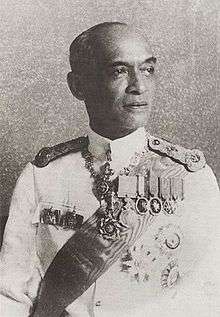 |
Prince Rangsit Prayurasakdi | 9 November 1947 | 18 June 1949[9] | 1 year, 221 days |
| 2 | 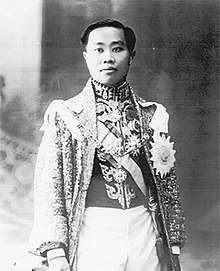 |
Prince Dhani Nivat | 18 June 1949[9] | 25 March 1950 | 280 days |
| (1) |  |
Prince Rangsit Prayurasakdi | 25 March 1950[10] | 4 June 1950[11] | 1 year, 221 days |
| (2) |  |
Prince Dhani Nivat | 4 June 1950[11] | 7 March 1951 | 276 days |
| 3 |  |
Prince Alongkot | 13 March 1951[12] | 8 April 1952[13] | 1 year, 26 days |
| (2) |  |
Prince Dhani Nivat | 8 April 1952[13] | 27 May 1963 | 11 years, 49 days |
| - |  |
Jit Na Songkha | 28 May 1963[14] | 8 June 1963 | 12 days |
| (2) |  |
Prince Dhani Nivat | 8 June 1963 | 9 July 1963 | 31 days |
| - |  |
Jit Na Songkha | 9 July 1963 | 14 July 1963 | 5 days |
| (2) |  |
Prince Dhani Nivat | 14 July 1963 | 20 June 1968 | 4 years, 342 days |
| - |  |
Jit Na Songkha | 20 June 1968 | 30 July 1968 | 40 days |
| (2) |  |
Prince Dhani Nivat | 30 July 1968 | 8 September 1974 | 6 years, 40 days |
| - |  |
Vongsanuwat Tevagul | 8 September 1974[15] | 24 March 1975[16] | 197 days |
| 4 |  |
Dej Snidvongs | 24 March 1975[16] | 8 September 1975 | 169 days |
| - |  |
Vongsanuwat Tevagul | 8 September 1975 | 5 December 1975 | 89 days |
| 5 | 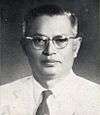 |
Sanya Dharmasakti | 5 December 1975[17] | 4 September 1998 | 22 years, 273 days |
| 6 | .jpg) |
Prem Tinsulanonda | 4 September 1998 | 13 October 2016 | 18 years, 40 days |
| - | 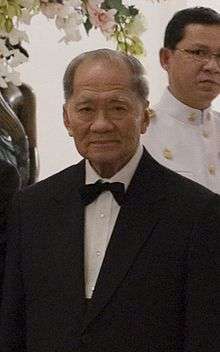 |
Tanin Kraivichien | 13 October 2016 | 2 December 2016 | 51 days |
| (6) | .jpg) |
Prem Tinsulanonda | 2 December 2016 | 13 October 2016 | 1 year, 325 days |
The Privy Council of Thailand
The Privy Council of Thailand (Rama IX)
| # | Picture | Name | From | Until |
|---|---|---|---|---|
| 1 |  | Prince Rangsit Prayurasakdi | 9 November 1947 | 18 Junuary 1949 |
| 2 |  | Prince Dhani Nivat | 9 November 1947 | 18 Junuary 1949 |
| 3 |  | Prince Alongkot | 9 November 1947 | 19 December 1952 |
| 4 |  | Plot Wichean Na Songkha | 9 November 1947 | 7 October 1974 |
| 5 |  | Adul Aduldejjarus | 9 November 1947 | 29 November 1951 |
| 6 |  | Prince Vivadhanajaya Jayanta | 8 April 1952 | 22 August 1960 |
| 7 |  |
Prince Nakkhatra Mangala | 8 April 1952 | 11 February 1953 |
| 8 |  | Jit Na Songkha | 8 April 1952 | 25 September 1976 |
| 9 |  | Hun Huntagun | 8 April 1952 | 27 August 1962 |
| 10 |  | Dej Snidvongs | 24 April 1953 | 7 October 1974 |
| 11 |  | Sak Senanarong | 14 July 1955 | 19 July 1955 |
| 12 |  | Laihud Tititlanon | 2 May 1957 | 26 March 1968 |
| 13 |  | Srisena Sombutsiri | 2 May 1957 | 6 July 1982 |
| 14 |  | Gumpan Utaravanit | 5 February 1960 | 7 October 1974 |
| 15 |  |
Thongchai Chotikasatian | 7 July 1964 | 18 January 1986 |
| 16 |  | Chalermlap Tavivong | 24 November 1966 | 27 October 1970 |
| 17 |  |
Sanya Dharmasakti | 18 June 1968 | 4 September 1998 |
| 18 |  |
Vongsanuwat Tevagul | 1 November 1971 | 3 April 1991 |
| 19 |  |
Pragob Hutasing | 26 March 1975 | 28 July 1995 |
| 20 |  |
Uttasit Sittisunton | 26 March 1975 | 16 September 1998 |
| 21 |  |
Jinda Boonyakom | 26 March 1975 | 8 November 1987 |
| 22 |  |
Chakkapanpensiri | 26 March 1975 | 13 October 1993 |
| 23 |  |
Samran Padtayakul | 19 December 1975 | 24 July 1986 |
| 24 |  |
Chao Na Sinwan | 19 December 1975 | 6 December 2016 |
| 25 |  |
Thanin Kraivichien | 15 December 1977 | 6 December 2016 |
| 26 |  |
Gun Itsarasena Na Ayuthaya | 18 April 1979 | 12 August 1996 |
| 27 |  |
Ussani Pramoj | 3 March 1984 | 6 December 2016 |
| 28 |  |
Gumton Sintavanon | 28 November 1987 | 6 December 2016 |
| 29 | .jpg) |
Prem Tinsulanonda | 23 August 1987 | 4 August 1998 |
| 30 |  |
Chulanop Sanitwong Na Ayuthaya | 24 December 1991 | 29 September 2006 |
| 31 | .jpg) |
Siddhi Savetsila | 24 December 1991 | 5 December 2015 |
| 32 |  |
Adulkit Kittiyakon | 9 April 1992 | 5 May 2004 |
| 33 |  |
Pichit Kullavanich | 13 July 1993 | 6 December 2016 |
| 34 |  |
Umpon Senanarong | 9 September 1994 | 6 December 2016 |
| 35 |  |
Jumrus Khemajaru | 15 November 1994 | 14 May 2015 |
| 36 |  |
Tavisan Ladawan | 3 October 1995 | 7 April 2006 |
| 37 |  |
Thep Devakul | 7 August 1997 | 6 December 2016 |
| (17) |  |
Sanya Dharmasakti | 4 September 1998 | 6 January 2002 |
| 38 |  |
Sakda Mokamakkul | 6 January 1999 | 20 February 2007 |
| 39 |  |
Kasem Wannachai | 18 July 2001 | 6 December 2016 |
| 40 |  |
Palakorn Suwanrat | 18 July 2001 | 6 December 2016 |
| 41 |  |
Sawat Wattanayakon | 18 July 2002 | 13 March 2012 |
| 42 |  |
Surayud Chulanont | 14 November 2003 | 1 October 2006 |
| 43 |  |
Santi Takral | 15 March 2005 | 29 April 2011 |
| 44 |  |
Chumpol Patjusanon | 15 March 2005 | 6 December 2016 |
| 45 |  |
Uttanit Ditumnat | 16 August 2007 | 6 December 2016 |
| (42) |  |
Surayud Chulanont | 8 April 2008 | 6 December 2016 |
| 46 |  |
Chanchai Likitjitta | 8 April 2008 | 6 December 2016 |
| 47 |  |
Supachai Poongam | 8 April 2008 | 6 December 2016 |
| 48 |  |
Chalit Pukpasuk | 18 May 2011 | 6 December 2016 |
The Privy Council of Thailand (Rama X)
On 2 December 2016, King Maha Vajiralongkorn reappointed General Prem Tinsulanonda president of the privy council. General Prem became regent pro tempore at the death of King Bhumibol Adulyadej on the 13 October 2016. After Vajiralongkorn accepted the invitation to become king he was able to appoint his own council.[18]
On 6 December 2016 the king appointed ten councillors,[19] seven from his father's council and three new members. Eight members from the previous council were not reappointed.[20]
As of October 2018 the council was composed mostly of retired military leaders and members of the judiciary, with 16 members:
Currently in office
| # | Picture | Name | From | Until |
|---|---|---|---|---|
| 1 | .jpg) | Prem Tinsulanonda | 2 December 2016 | Present |
| 2 |  | Surayud Chulanont | 6 December 2016 | Present |
| 3 |  | Kasem Watanachai | 6 December 2016 | Present |
| 4 |  | Palakorn Suwanarat | 6 December 2016 | Present |
| 5 | .jpg) | Chalit Pukbhasuk | 6 December 2016 | Present |
| 6 |  | Supachai Phungam | 6 December 2016 | Present |
| - |  |
Charnchai Likhitchittha | 6 December 2016 | 18 January 2017 |
| 7 |  | Atthaniti Disatha-Amnarj | 6 December 2016 | Present |
| 8 |  | Paiboon Koomchaya | 6 December 2016 | Present |
| 9 |  | Dapong Ratanasuwan | 6 December 2016 | Present |
| - | .jpg) | Teerachai Nakwanich | 6 December 2016 | 19 June 2018 |
| - |  | Wirach Chinvinitkul | 13 December 2016 | 2 March 2018 |
| 10 |  | Charunthada Karnasuta | 13 December 2016 | Present |
| 11 |  | Kampanat Ruddit | 23 December 2016 | Present |
| 12 |  |
Pongthep Nuthep | 13 March 2018 | Present |
| 13 |  | Chirayu Isarangkun Na Ayuthaya | 13 March 2018 | Present |
| 14 |  | Amphon Kittiamphon[5] | 2 October 2018 | Present |
| 15 |  | Chalermchai Sitthisart[5] | 2 October 2018 | Present |
| 16 |  | Chom Rungsawang[5] | 2 October 2018 | Present |
See also
References
- ↑ http://kanchanapisek.or.th/ohmpc/General-Prem-Tinsulanonda.en.php
- ↑ "Archived copy". Archived from the original on 2009-02-09. Retrieved 2009-01-05.
- ↑ McGeown, Kate (21 September 2006). "Thai king remains centre stage". BBC News. Retrieved 17 October 2016.
- ↑ "Gen Prem appointed president of the new King's Privy Council". Bangkok Post. 7 December 2016. Retrieved 7 December 2016.
- 1 2 3 4 5 Chachavalpongpun, Pavin (12 October 2018). "Beware the Thailand King's New Power Play". The Diplomat. Retrieved 13 October 2018.
- ↑ "Archived copy". Archived from the original on 2009-02-09. Retrieved 2009-01-04.
- ↑ Constitution of Thailand Archived 2007-06-28 at Archive.is
- ↑ John, Eric G (2009-11-23). "Thailand: Circles of Influence Inside the Institution of the Monarchy in King Bhumibol's Twilight". Wikileaks. Bangkok: US Embassy. p. 22. Retrieved 17 October 2016.
- 1 2 http://www.ratchakitcha.soc.go.th/DATA/PDF/2492/A/033/479.PDF
- ↑ http://www.ratchakitcha.soc.go.th/DATA/PDF/2493/A/032/646.PDF
- 1 2 http://www.ratchakitcha.soc.go.th/DATA/PDF/2493/A/032/646.PDF
- ↑ http://www.ratchakitcha.soc.go.th/DATA/PDF/2494/A/018/404.PDF
- 1 2 http://www.ratchakitcha.soc.go.th/DATA/PDF/2495/A/027/640.PDF
- ↑ http://www.ratchakitcha.soc.go.th/DATA/PDF/2506/A/053/322.PDF
- ↑ http://www.ratchakitcha.soc.go.th/DATA/PDF/2515/A/198/255.PDF
- 1 2 http://www.ratchakitcha.soc.go.th/DATA/PDF/2518/A/070/79.PDF
- ↑ http://www.ratchakitcha.soc.go.th/DATA/PDF/2518/A/252/1.PDF
- ↑ "Wissanu explains royal succession process". Bangkok Post. 15 October 2016. Retrieved 17 October 2016.
- ↑ "Thai king appoints new members to royal council". www.atimes.com. Reuters. 6 December 2016. Retrieved 14 December 2016.
- ↑ "King appoints 10 members to his Privy Council". Bangkok Post. 7 December 2016. Retrieved 7 December 2016.